unit3 the million pound bank-note[下学期]
文档属性
| 名称 | unit3 the million pound bank-note[下学期] |
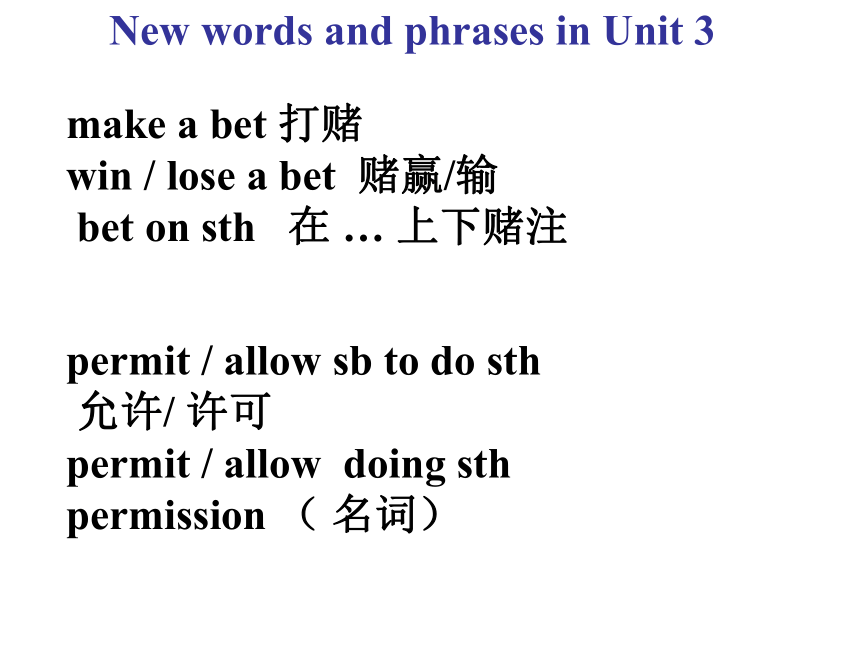
|
|
| 格式 | rar | ||
| 文件大小 | 4.8MB | ||
| 资源类型 | 教案 | ||
| 版本资源 | 人教版(新课程标准) | ||
| 科目 | 英语 | ||
| 更新时间 | 2007-03-17 00:00:00 | ||
图片预览

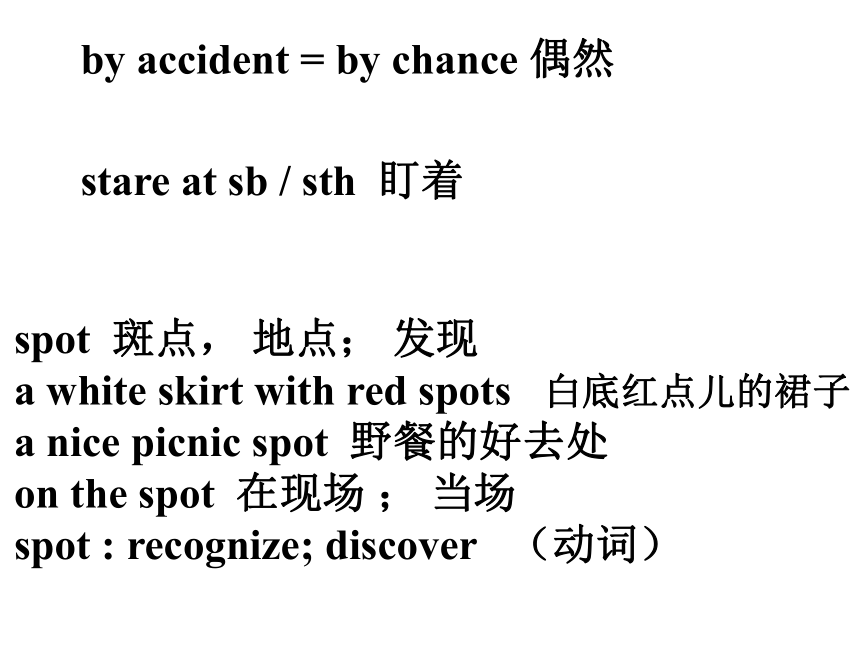
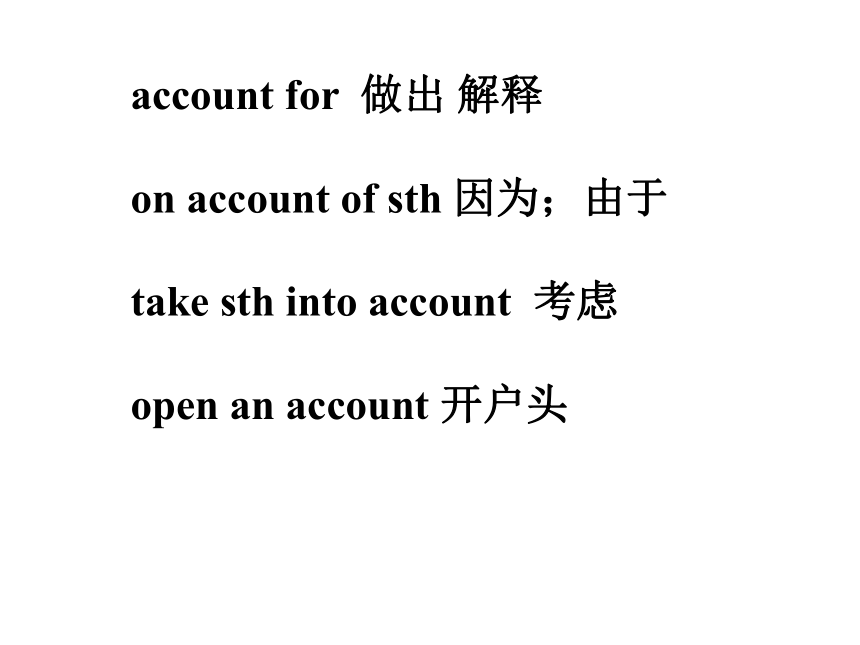
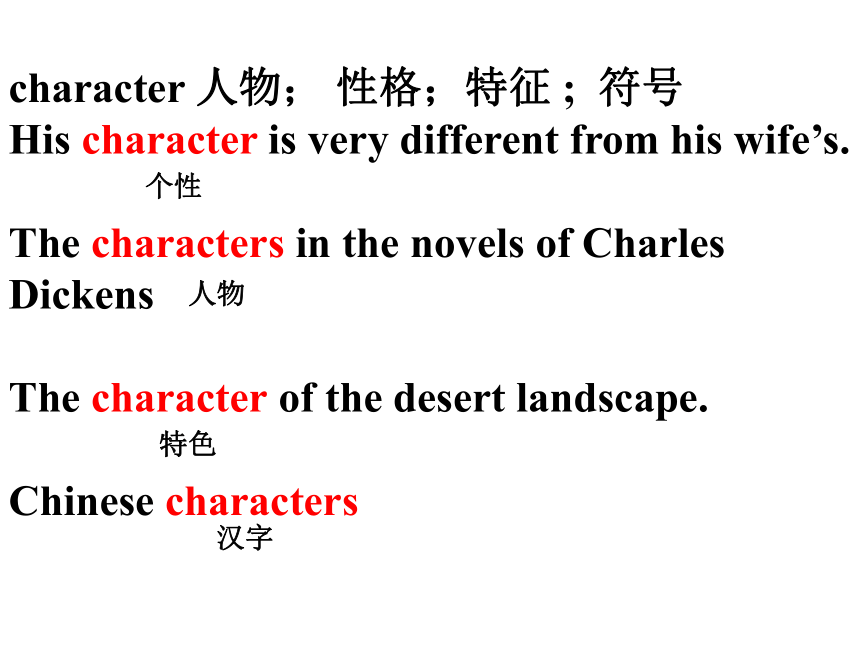
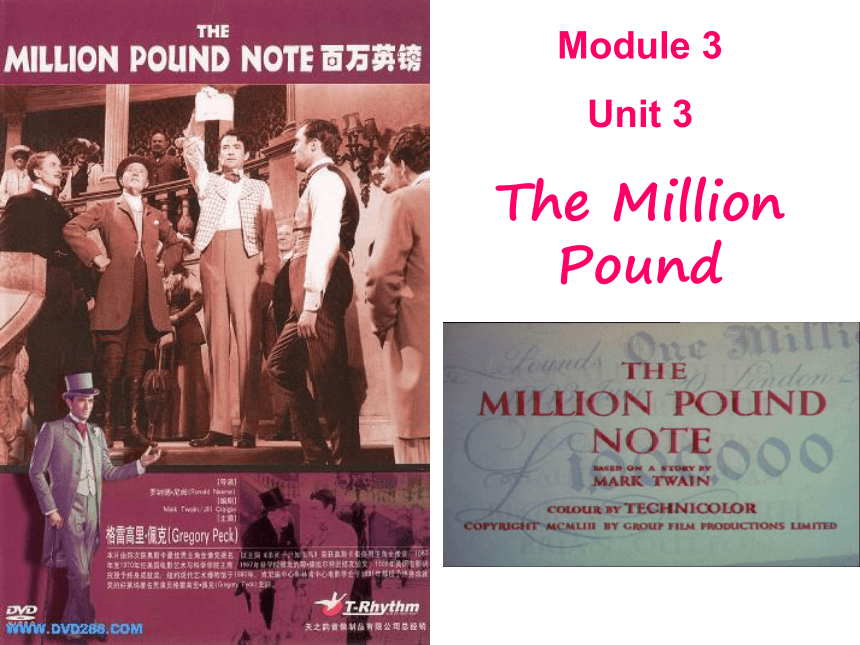

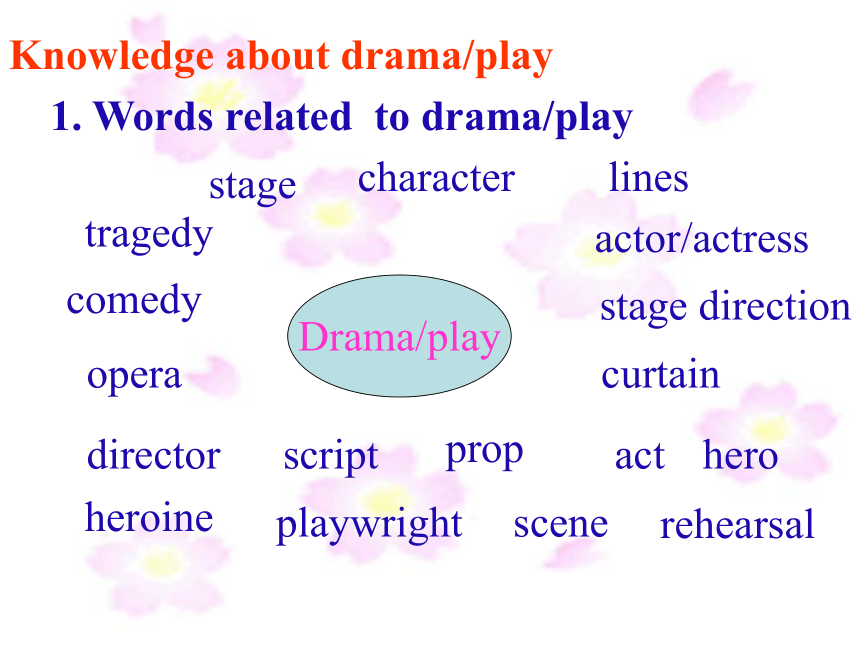
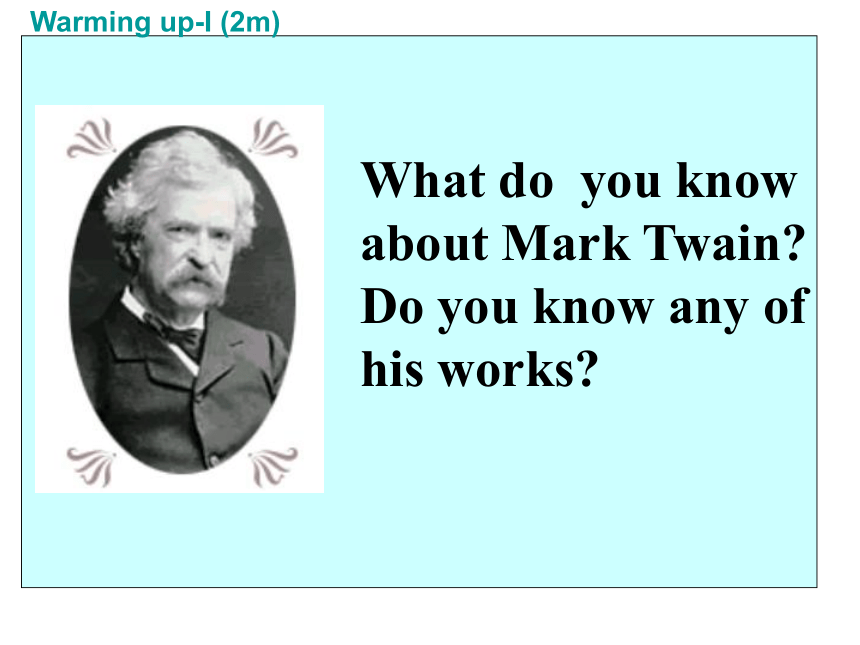
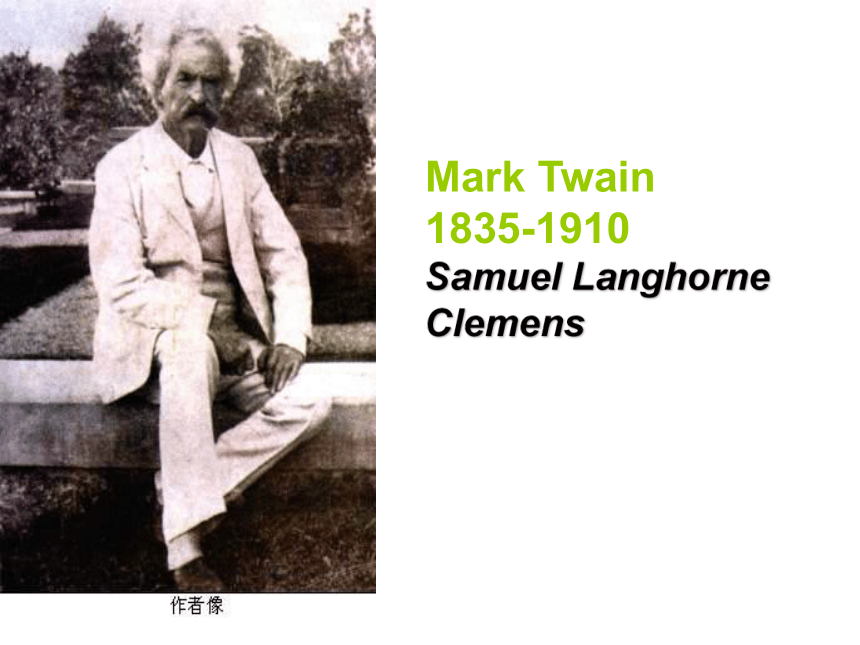

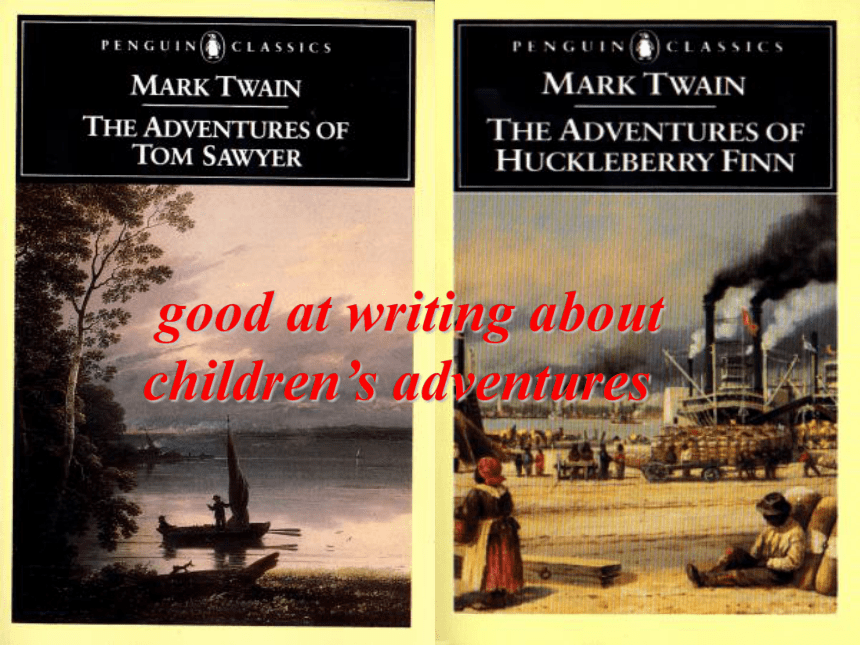
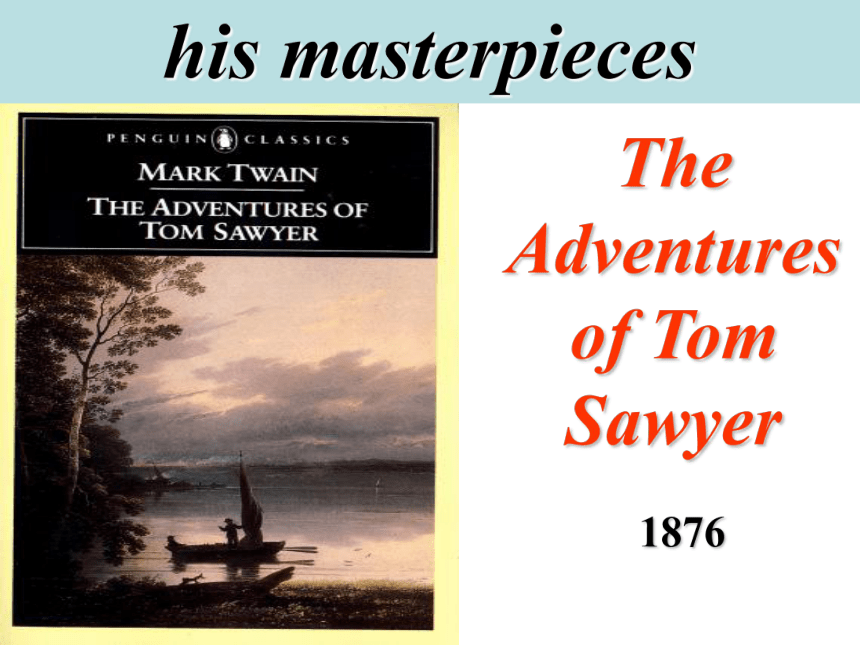
文档简介
课件129张PPT。New words and phrases in Unit 3make a bet 打赌
win / lose a bet 赌赢/输
bet on sth 在 … 上下赌注permit / allow sb to do sth
允许/ 许可
permit / allow doing sth
permission ( 名词)by accident = by chance 偶然
stare at sb / sth 盯着
spot 斑点, 地点; 发现
a white skirt with red spots 白底红点儿的裙子
a nice picnic spot 野餐的好去处
on the spot 在现场 ; 当场
spot : recognize; discover (动词)account for 做出 解释
on account of sth 因为;由于
take sth into account 考虑
open an account 开户头character 人物; 性格;特征 ; 符号
His character is very different from his wife’s.
The characters in the novels of Charles
Dickens
The character of the desert landscape.
Chinese characters
个性人物特色汉字Module 3
Unit 3
The Million Pound
Bank-notePeriod 1&2 Warming
up and Reading IKnowledge about drama/play 1. Words related to drama/playDrama/playtragedycomedyoperastagecharacterstage directionlinesdirectorcurtainplaywrightactor/actressscriptpropactsceneheroheroinerehearsalWhat do you know about Mark Twain? Do you know any of his works?Warming up-I (2m)Mark Twain
1835-1910
Samuel Langhorne Clemens
The greatest humorist of the 19th century American literature.
Novels:
The Adventures of Tom Sawyer (1876)(汤姆·索亚历险记)
The Prince and the Pauper (1882)(皇子与贫儿)
The Adventures of Huckleberry Finn (1894)
(哈克贝利·费恩历险记)Mark Twain:
(1835—1910) good at writing about children’s adventureshis masterpieces1876The Adventures of Tom Sawyerhis masterpieces1881The Adventures of Huckleberry Finnhis short stories1.Running for Governor2.The £ 1,000,000 Bank-NoteAbout Mark TwainFind out more information about Mark Twain and then complete the following chart.Warming up-II (5m)In FloridaHannibal, Missouri, along the MississippiThe Adventures of Tom Sawyer, The Adventures of Huckleberry Finn and Life on the MississippiIt means the water is two fathoms deep.(=12feet)He left school to look for work.A printer, a riverboat pilot, a soldier, a gold miner, a business- man and a newspaper reporter. Question & Thinking:
1.What was Mark Twain’s life like in the last years of his life?
2.As a result of this, what happened to his writing?
It was filled with sad events, loneliness and the loss of much money.His writing lost most of its humour and became sad like him.The Million Pound Bank-Note
Reading 1ACT1SCENE1&2A brief introduction to the storyPre-reading-I (2m)Two rich gentlemen made a bet on what would happen to a person if he was given a million pound note.
Henry, the hero of the story, an American young man, sailed too far, drifted out to the ocean,A British ship, for London, passing by, fortunately saved him.
ACT1SCENE3The story
begantimeplacepeopleeventRead the text and take down some notes according to the four things (elements)In the summer of 1903.
four. Henry, two brothers (Roderick, Oliver), the servant (James).Henry’s experience with the ______________ after he landed in ______________ by____________.London of Britaintwo brothersLondon accidentSkimming : answer the following questions:1. Where does Henry Adams come from?Does he know much about London?
2. What did he do in America?
3. Why did he land in Britain?
Reading-II (3m)1. Where does Henry Adams come from?Does he know much about London?
Henry comes from San Francisco.
No, he doesn’t know London at all.2. What did he do in America?He worked for a mining company. 3. Why did he land in Britain?He was sailing out of the bay when he was carried out to sea by a strong wind and was saved by a ship for London.
Put the following events in correct order.
Henry wandered in London streets.
About a month ago Henry Adams was sailing out of the bay.
The next morning he was spotted by a ship.
Towards nightfall he found himself carried out to sea by a strong wind.
On the ship he earned his passage by working as an unpaid hand.Reading III-pair work(5m)Key:(2) About a month ago Henry Adams was sailing out of the bay.
(4) Towards nightfall he found himself carried out to sea by a strong wind.
(3) The next morning he was spotted by a ship.
(5) On the ship he earned his passage by working as an unpaid hand.
(1)Henry wandered in London streets.
Henry was an_________. One day he had an
accident in a_____. Luckily he was survived by a
ship for_______. He arrived in London by earning
his passage without pay. He was _____in the street
in_____. To his surprise an ________ thing
happened. Two rich brothers gave him a million
pound bank-note because they had made a_____. incredibleAmericanLondonbayrags lostbetRetell the story by filling the following passage. Reading-IV (5m)Unit 3
The Million Pound
Bank-notePeriod 3 Learning
about languageChecking answer – I (2m) Answer keys for Ex.1 on Page 19:servantstare atby accidentpassagenightfallincredibleaccount forto be honestappearancesillypatiencea bank-notetalepermitChecking answer – II (2m) Answer keys for Ex.2 on Page 20:tale
2. bet4. unbelievable6. by accident
7. appearance5.servant3. nightfallChecking answer – III ( 2m ) Answer keys for Ex.3 on Page 20:silly
2. permit, go ahead
3. stare , patience
4.made a bet5. passage
6. account for
7. to be honest, jealous
8. willingness, probably The Million Pound Bank-Note
Reading 2If a rich person gives you a large amount of money to use as you like, what will you do with it? Why?What will you do with the money?Buy a houseTravel around the world…Why?What would Henry do with the money ?
Pounds
£ Using Language14ACTSCENE At the restaurantWhat would happen to Henry at the restaurant?A. He was not taken seriously.
B. He was treated politely.
Pre-reading(1m)Fast ReadingRead through the text quickly and then complete the True or False questions.The owner looked down upon Henry when he noticed Henry’s appearance.
Henry asked for more of the same food because he is an American who like to eat a lot.
When Henry saw the million pound bank-note, he was happy and proud of it.
The owner didn’t believe that the bank-note was real and he asked Henry to get out of the restaurant.TFFFReading-I (3m)What did the hostess feel when Henry came into the restaurant? How do you know?
2. How about Henry’s feeling after he finished eating and asked another one?
3. Why were the owner and hostess shocked when they saw the million pound bank-note in Henry’ hand?
4. What made them trust that the bank-note was genuine?
5. What can we learn from this story?Read the passage and answer the following questionsReading-II (8m)What did the hostess feel when Henry came into the restaurant? How do you know?She felt very impatient and looked down upon Henry because of his poor appearance.
“Why, look at him, he eats like a wolf.”2. How about Henry’s feeling after he finished eating and asked another one?He felt satisfied and full. That was a wonderful meal.3. Why were the owner and hostess shocked when they saw the million pound bank-note in Henry’ hand?Because they never thought that the bank-note belonged to such a person in rags.4. What made them trust that the bank-note was genuine?Mr. Clemens’ words. He said “Two notes in this amount have been issued by the Bank of England this year. No thief would want that to happen.”5. What can we learn from this story?We shouldn’t judge people by appearance.
Money is everything in the capitalist society.What kind of person is the owner? why?snobbishOral Practice(3m)Is money everything?DiscussionDiscussion(5m)Appreciation Money is not everything
It can buy you a house but not a home,
It can buy you a bed but not sleep,
It can buy you a clock but not time,
It can buy you books but not knowledge,
It can buy you blood but not life,
It can buy you sex but not love,
It can buy you a position but not respect,
It can buy you medicine but not health,
Money may not be the root of all evil(罪恶),
But it often bring us anguish (苦恼)and regrets(懊悔).Language points for Reading I
Language points for Reading II
Language Data BankLanguage points for Reading IA large amount /quantity / sum of 修饰不可数名词。
Now he has a large amount of money. He can do anything he wants with it.1) 只用于修饰可数名词的有:
a number of/numbers of
A great/ good many
2) 只用于修饰不可数名词的有:
a great (good) deal of
a great (good) amount/ quantity/sum of3) 既可修饰可数名词, 也可修饰
不可数名词的有:
a lot of
lots of
plenty of2. make a bet
make a bet on sth with sb.
bet on sth with sb.
I bet …= I’m certain… 我肯定…
I bet he has gone swimming . He loves it.3. Now ladies and gentlemen, you’re about to hear the most incredible tale.
女士们, 先生们, 你们将要听到一个最令人难以置信的故事。
be about to 将要,指动作原先就计划好的或有迹象将要发生。
be about to do…when… 正要(即将)做某事突然
e.g. Just as I was about to leave the room when the telephone rang.
我正要离开房间, 电话铃响了。4. He is lost in London. 他在伦敦迷了路。
be lost 迷路;倾心于某事
e.g. He was lost in the forest for three
days and nights and was finally rescued
by his friends. 他迷失在树林里三天三夜, 最后被朋友们救了出来。
e.g. He was so lost in reading this book
that he forgot the time of his train.
他看书入了神, 把上火车的时间都忘了。5. Permit me to lead the way, sir.
先生, 请让我来带路吧。
permit/allow sb to do 准许……做某事
e.g. Will you permit us to use this room for a meeting this afternoon? 你能准许我们今天下午在这个房间开个会吗?
permit/allow doing 准许做某事
e.g. The rules of the club don’t permit smoking. 俱乐部的规矩是不允许吸烟。6. go ahead :be carried out; take place执行,进行,举行
1)尽管( despite)天气不好,旅行将照常进行。
Despite the bad weather, the journey will go ahead.
新桥的修建将按计划进行。
The building of the new bridge will go ahead as planned.7. by accident= by chance
eg. I only found it by accident.
8. stare at stare at angrily= glare at
9. find oneself carried out to sea (发现某人自己被漂流到海上)
find oneself +分词 (发现某人自己不知不觉…)
He found himself walking in the direction of the park.10. I earned my passage by working as unpaid hand, which accounts for my appearance. 我靠做义工来顶替船费, 这
就是我为什么衣冠不整的原因了。
earn one’s passage 挣取旅费
e.g. He couldn’t afford the fare, and so
he had to earn his passage by doing jobs
on the ship. 他交不起船费, 只得靠在
船上做些零活来挣取路费。11.account for 对……做出解释;说明原因
e.g. Nobody could account for his absence from school.
没人能对他旷课做出解释。12. to be honest (with sb.)= to tell you the truth = honestly speaking13.silly / foolish / stupid
4) How _______ of you to agree!
5) How _______ of him not to understand such a simple truth!
6) He was ____ to go camping without taking warm clothes with him.
7) I don’t want to listen to your _____ (无聊的) story.从语气上来说stupid>foolish>silly stupid——缺乏正常理解力,智力(天生的) 说明蠢,贬义 eg. Don't be stupid enough to believe that foolish——缺乏常识 eg. How foolish of her to spend so much time on it silly——无知的,可笑的 eg. Don't ask your father so many silly questions. 13.silly / foolish / stupid
4) How _______ of you to agree!
5) How _______ of him not to understand such a simple truth!
6) He was ____ to go camping without taking warm clothes with him.
7) I don’t want to listen to your _____ (无聊的) story.foolishstupidsillysilly1. 他妈妈是不会允许他晚归的。
His mother wouldn’t permit him to come back late.
2. 他登上飞往巴黎的飞机时偶然被警方认出。
He was spotted by police by accident boarding a plane for Paris.
3. 你曾和你朋友打过赌吗?
Have you made a bet with your friends?
4. 他对他的愚蠢的行为做出的解释实在是
难以置信。
What accounts for his silly behavior is really unbelievable.Take a breakIt’ll cost a tiny bit.He’s asked for more of the same. The waiter leaves for the kitchen. 1.那会花费稍多一点。2.侍者前往厨房。3.他又点了同样的一份。the same ……that /the same ……asthe same …that 一般指同类同物,而the same…as 指同类不同物Language points for Reading IIThis is the same pen that I lost.
这就是我丢的那枝笔(同一枝)。
This is the same pen as I lost.
这枝笔和我丢的那枝一样(同类不同物)。4. Well, we will have to take a chance.
哦,我们要赌一把了。
take a/ the/ chance/ chances
碰运气;冒风险e.g. We decided to take a chance on the weather and have the party outdoors.
我们决定与老天爷赌一把,在户外聚会。5. in a rude manner
manners 与manner的用法 1)复数形式manners意思是“礼貌;礼节;规矩;风俗”。如: His good manners were praised by his teachers. 他的彬彬有利受到了老师的称赞。
He has no manners at all.他一点也不讲礼貌。
2)manner的意思是“方式;方法;举止;态度”。如: He spoke in such a manner as to hurt their feeling. 他讲话的态度伤害了他们的感情。
She has a very easy manner. 她的举止落落大方。 6. scream
scream v.&n.
她愤怒地(向我)尖声喊叫。
She screamed (out at me )in anger.
外面飓风呼啸着。
The hurricane screamed outside.
a scream of pain, a scream of laughter, excitement7. genuine fake
1) real, not fake or artificial
真的,非伪造的,非人工的
a genuine pearl a genuine note
2) sincere, honest 真诚的,真实的
She seems genuine but I can’t trust her. 8. issue
1) publish 出版,发行
The Bank of England issued the
million pound notes.
2) come, go or flow out 流出
blood issuing from a wound
9. in rags 衣衫褴褛
rag: odd cloth
He is in rags. 10. indeed
1) in fact 事实上,其实
I don’t mind. Indeed, I am willing to help you.
2) truly, really, certainly
的确,实在的,确实
- Did he finish the work?
- Indeed, he did. 11.It would be wrong of me not to trust a gentleman such as yourself, sir…..
be +adj. +of sb. 说明某人的本质
be + adj. +for sb.对某人有好处
Having a walk after supper is good for your health.12. even if
=even though 即使
He doesn’t want to buy the nice house, even if he gets a lot of money.
They came to help us, even if they had many things to do.13. get into trouble 招致不幸, 陷入困境, 被捕
14.over the next two decades 随后的二十多年中
15.humor= humour n.
humorousTake a breakACT1SCENE5Listening
&
Speaking 1. Why does Henry worry after he leaves the restaurant?
2. Why does he go back to the two brothers’ house?
3. Why can’t he see the two brothers again?
4. What do they ask him to do?
Listening Listening text Henry feels happy only for a moment. As he walks away from the restaurant,_____________________________________________. He runs back N=Narrator S=Servant H=Henry N: Scene 5he begins to worry that he hasgot the bank-note by mistake
to the brothers’ home and knocks on the front door. No one comes. He walks around to the side of the house and knocks on another door. The servant opens it. S: May I help you, sir?
H: Yes. __________________________
about —I need to see the two brothers S: They’ve gone, sir.______________.
H: But they were just here two hours ago!
S: I’m sorry, sir.________________
___________— a month from today.
H: A month? But I can’t believe—Gone travellingThey will be backin a month S: Good day, sir.
N: Henry sits down on the stairs, opens the envelope and takes out the letter to read. The letter says: “You are an intelligent and honest man, as one may see by your face. ____________
_________________________________We also believeyou are poor and a stranger to this city.
Inside you will find a sum of money. It is loaned to you for a short time.
___________________________
__________________. I have a bet on you. If I win it, you shall have any job that you can do as my thanks.”
H: Well, how about that!Come back to our home with itin exactly 30 days
Listen to Act One, Scene 5 on the tape and answer these questions:
1. Why does he go back to the two brothers’ house?
2. Why can’t he see the two brothers again?
3. What do they ask him to do?He goes back to check whether they meant to give him the bank-note.Because they have gone traveling.They ask him to go back to their house in thirty days’ time.What will Henry do with the Million Pound Bank-Note?Brainstorming:buy a houseput it into a bankopen a shopbuy some new clothes!travel around the worldSpeakingNow, make a dialogue for Act Two, Scene 1 with a partner using all of the following information:Henry tells a clerk that he wants a coat for a suit. The clerk shows him a cheap coat downstairs. Henry doubts if he should take it. The clerk persuades him to buy it. Henry agrees, but explains that he can’t pay him right now as he has no small change.Discussion:What will happen in the tailor’s shop after Henry shows the clerk and the owner the bank-note?Now listen to Act Two, Scene 2 of the play on the tape to see what really happened. Then answer the following questions:Why doesn’t the clerk give Henry his change right away?
2. Is Henry glad to get more than one suit coat? How do you know?
3. What does the owner offer to do for Henry? Why?The clerk is shocked after receiving such a huge sum of money.No, Henry wants only one coat and complains that the others are unnecessary.He offers to help Henry get a room in the “Ritz”, one of the best hotels in London.Workbook part sentence translation1. He has been in debt for quite a long time. It has become his big problem how to earn his living.
2.They think they ought to combine the two small restaurants to make a larger one.
( They think the two small restaurants ought to be combined to make a larger one.)
3. Li Hua found that his English was so limited that he couldn’t make himself understood by the customers in the shop.
4. If they know the benefit of studing, they won’t be tired of it.
5. The old gentleman just stood there glaring at the pickpocket and did not say a word.
6. We should be honest and get rid of the habit of telling lies.1. As a matter of fact, he was spotted by accident when he got into the office.
2. To be honest, the gentleman was in rags in order to pretend that he was poor.
3.He worked as an unpaid director in the company. But when the owner of the company shouted at him in a rude manner again and again, he began to lose his patience.4. She screamed as if she had seen a snake.
5. Even if your company is large, it can still get into trouble by growing too quickly.
6. The reasons he gave to account for his silly actions were indeed unbelievable.宾 语 从 句
表语从句 Unit3 The Million Pound Bank-NoteGrammar 名词性从句相当于名词的作用,在句中可作主句的主语、表语、宾语和同位语。因此,名词性从句又可分为主语从句、表语从句 、宾语从句和同位语从句。
What is a noun clause? 何谓名词性从句?宾 语 从 句 I know him .
2. I know who he is . 主语谓语宾语(简单句)主语谓语宾 语 从 句连词从句主语 从句谓语 主 句(复合句)宾语从句的概念:
宾语从句在复合句中作主句的宾语。句子结构:
主句 +连词(引导词)+ 宾语从句一、连词(引导词)
1. 当宾语从句是陈述句时(包括肯定句和否定
句),连词由that引导,因为that在从句中不作
任何成分,也没有任何具体意思,因此在口语
或非正式文体中常省略Lin Tao feels (that) his own team is even better.
She says (that) she won’t take part in the sports meeting
next Sunday.
Jim thought (that) the train was like a big moving party.
He said (that) he would like to see the headmaster.在主句为动词be加某些形容词(如sorry, sure, afraid, glad等)作表语时,后面所跟的省略that的从句也可算是宾语从句I’m sorry (that) I don’t know .
We’re sure (that) our team will win .
I’m afraid (that) he won’t pass the exam .2. 当宾语从句是一般疑问句时,由连词whether或if引导(口语中常用if),因为if/whether翻译成:“是否”,具有一定的意义,所以不能省略Lily wanted to know if /whether her grandma
liked the handbag .
Let’s see if /whether we can find out some
information about that city .
She asked me if /whether she could borrow
these books .3. 当宾语从句是特殊疑问句时,由连接代词(what, who, whom, which, whose)或连接副词(when, where, how, why)引导,因为连接代词
或连接副词在从句中担任一定的句子成分,具
有一定的意义,所以不可以省略Do you know what he said just now ?
I don’t remember when we arrived .
I asked him where I could get so much money .
Please tell me who (whom) we have to see .
Do you know what time the plane leaves ? 带how的词组也都可以引导宾语从句
Could you tell us how often you go abroad for a holiday ?Could you tell us how long the meeting will last ?I don’t know how far it is to the cinema .Please tell us how many students there are in your school ?Can you tell us how old his brother is ?Please tell us how soon you will be ready .Could you tell us how much it costs to fly to Hainan ?二、时态
1. 如果主句是现在的时态 (包括一般现在时 ,
现在进行时,现在完成时),从句的时态可根
据实际情况而定,(包括一般现在时,一般过
去时,一般将来时,现在完成时等)I know he lives here .
I know he lived here ten years ago .
I have heard that he will come tomorrow .2.如果主句是过去的时态(包括一般过去时,过去进行时),那么从句的时态一定要用相对应的过去的某种时态(包括一般过去时,过去进行时,过去将来时, 过去完成时)I knew who lived here.
I saw she was talking with her mother.
He asked whether his father would come back
tomorrow.
He said that he had seen it .3.当从句是客观真理,定义,公理,定理
时用一般现在时。The teacher said that the sun travels
around the earth .三、语序
宾语从句的语序用陈述语序:
连接词+主语+谓语+其他成分1. When will he go to the library?
?His brother asks when he will go to the library .
?His brother asks when will he go to the library . 2. What does he want to buy ?
? I don’t know what he wants to buy .
? I don’t know what does he want to buy .3. Who are we going to meet ?
? Can you tell me who we are going to meet ?
? Can you tell me who are we going to meet ?1.could / would是委婉语气,而不是过去式,因此宾语从句的时态根据实际情况用不同时态。注意事项Could you please tell me where we show our
tickets ?
Could you tell us which gate we have to go to ?
Would you like to know when he will come back ?2. 如果主句的谓语动词是ask时,连词不可能是that;如果主句的谓语动词是say时,连词用thatShe says (that) she will leave a message on
his desk .
He said (that) he was going to take care of
the child .
He asks if I like playing the piano .
You may ask the man over there how you
can get to the bus station .
3. 如果从句中含有or或or not时,只能
用whether而不用ifCould you tell me whether that’s a fast
train or not ?
Do you know whether he is right or not ?
I don’t care whether he’ll stay here or not .4. 连词+宾语从句 连词+to doI don’t know what I shall do next .
I don’t know what to do next .
She didn’t decide which one she would choose .
She didn’t decide which one to choose .
Please tell me whom you’ll give the letter to .
Please tell me whom to give the letter to .1.?The young man asked _____ it's summer or winter.
A. either B. that C. weather D. whether
2.??We don't know ______ they did it .
A. how B. who C. what D. which
3. The teacher asks us ____ Jim can come back on time .
A. that B. if C. when D. what time
4. Does anybody know ______ we will have a sports meeting this weekend or not .
A. if B. where C. whether D. that
?
?
DABC5. Could you show me ________ ?
A. how can I get to the station
B. where is the station
C. how I could get to the station
D. how I can reach the station
6. Please tell me _______.
A. what does he like B. what he does like
C. what he likes D. what he like
7. My sister told him ________ .
A. what day was it B. when the train arrived
C. who was she waiting D. where did you liveCBD8. Someone is ringing the doorbell . Go and see _______ .
A. who is he B. who he is
C. who is it D. who it is
9. Could you tell me how long __________ ?
A. you have bought the watch
B. you have kept this science book
C. have you been away from China
D. have you been a member of Greener China
10. He says that if it _______ tomorrow , he _______ fishing .
A. will rain , won't go B. rained , wasn't go
C. rains , won't go D. rain , will go BCD表语 从 句 What is predicative?表语(predicative),就是放在连系动词(linking?verb)如?be,become, get,seem?等等之后,用来说明主语的身份,特征或状态等. 在基本句型中,表语所采用的词类主要是名词,形容词和副词等 1. The question is difficult.
2. The question is whether it is worth doing . (简单句)(复合句)主语主语谓语谓语连词表语主 句表 语 从 句从句表语从句的概念:
表语从句在复合句中作主句的表语。句子结构:
主句 +连词(引导词)+ 表语从句The Predicative Clause
that 引导的表语从句
that 仅起连接作用,无意义,在句中不作任何成分,通常不可省略。这种从句往往是对主句主语的内容起进一步解释的作用。
e.g. The chance is that one smoker in four will die from smoking.
2. whether 引导的表语从句
连接词whether起连接作用, 意为“是否、究竟、到底”(注意:if不能引导表语从句) 在句中也不作任何成分。
e.g. The question is whether what man will turn up in time.4. where, when, why, how引导的表语从句
连接副词where, when, why, how除在句中起连接作用外,在从句中还充当时间、地点、方式、原因状语,本身具有词义。
e.g. That’s where I can’t agree with you.
This is why Sara was late for the meeting.
This is how they overcome the difficulties.
My strongest memory is when I attended an American wedding.5. 其他连词as if, because, as, as though 引导的表语从句
because引导表语从句通常只用于“This/That/It is because…”结构中。
as if/though引导的表语从句常置于连系动词look, seem, sound, be, become等后面,常用虚拟语气,表示不存在的动作或状态。
e.g. It sounds as if/though somebody was knocking at the door.
My anger is because you haven’t written to me for a long time.1.Go and get your coat.It's_______you left it. A.there B.where C.there were D.where there
2.The problem is_______ he has enough time. A.if B.whether C./ D.that
3.He made a promise_______ he would help me. A.what B.when C.that D.which
4.I remember_______ this used to be a quiet village. A.how B.when C.where D.what
5.It is generally considered unwise to give a child_______ he or she wants. A.however B.whatever C.whichever D.whereverBBCBBPractice – choosing ( 10m )Thank you !writingLi Ming used to be a healthy boy, but over a year ago, he got into the habit of eating a lot of junk food and snacks. Besides, he spent a lot of time lying on the sofa, watching TV, and did little exercise. As a result, he put on so much weight that he found it difficult to climb the stairs. So Li Ming decided to change the unhealthy life style. He began to have a balanced, healthy diet. He also took part in various sports activities such as swimming, skating, running and playing basketball. Months later, Li Ming became as fit as before.
win / lose a bet 赌赢/输
bet on sth 在 … 上下赌注permit / allow sb to do sth
允许/ 许可
permit / allow doing sth
permission ( 名词)by accident = by chance 偶然
stare at sb / sth 盯着
spot 斑点, 地点; 发现
a white skirt with red spots 白底红点儿的裙子
a nice picnic spot 野餐的好去处
on the spot 在现场 ; 当场
spot : recognize; discover (动词)account for 做出 解释
on account of sth 因为;由于
take sth into account 考虑
open an account 开户头character 人物; 性格;特征 ; 符号
His character is very different from his wife’s.
The characters in the novels of Charles
Dickens
The character of the desert landscape.
Chinese characters
个性人物特色汉字Module 3
Unit 3
The Million Pound
Bank-notePeriod 1&2 Warming
up and Reading IKnowledge about drama/play 1. Words related to drama/playDrama/playtragedycomedyoperastagecharacterstage directionlinesdirectorcurtainplaywrightactor/actressscriptpropactsceneheroheroinerehearsalWhat do you know about Mark Twain? Do you know any of his works?Warming up-I (2m)Mark Twain
1835-1910
Samuel Langhorne Clemens
The greatest humorist of the 19th century American literature.
Novels:
The Adventures of Tom Sawyer (1876)(汤姆·索亚历险记)
The Prince and the Pauper (1882)(皇子与贫儿)
The Adventures of Huckleberry Finn (1894)
(哈克贝利·费恩历险记)Mark Twain:
(1835—1910) good at writing about children’s adventureshis masterpieces1876The Adventures of Tom Sawyerhis masterpieces1881The Adventures of Huckleberry Finnhis short stories1.Running for Governor2.The £ 1,000,000 Bank-NoteAbout Mark TwainFind out more information about Mark Twain and then complete the following chart.Warming up-II (5m)In FloridaHannibal, Missouri, along the MississippiThe Adventures of Tom Sawyer, The Adventures of Huckleberry Finn and Life on the MississippiIt means the water is two fathoms deep.(=12feet)He left school to look for work.A printer, a riverboat pilot, a soldier, a gold miner, a business- man and a newspaper reporter. Question & Thinking:
1.What was Mark Twain’s life like in the last years of his life?
2.As a result of this, what happened to his writing?
It was filled with sad events, loneliness and the loss of much money.His writing lost most of its humour and became sad like him.The Million Pound Bank-Note
Reading 1ACT1SCENE1&2A brief introduction to the storyPre-reading-I (2m)Two rich gentlemen made a bet on what would happen to a person if he was given a million pound note.
Henry, the hero of the story, an American young man, sailed too far, drifted out to the ocean,A British ship, for London, passing by, fortunately saved him.
ACT1SCENE3The story
begantimeplacepeopleeventRead the text and take down some notes according to the four things (elements)In the summer of 1903.
four. Henry, two brothers (Roderick, Oliver), the servant (James).Henry’s experience with the ______________ after he landed in ______________ by____________.London of Britaintwo brothersLondon accidentSkimming : answer the following questions:1. Where does Henry Adams come from?Does he know much about London?
2. What did he do in America?
3. Why did he land in Britain?
Reading-II (3m)1. Where does Henry Adams come from?Does he know much about London?
Henry comes from San Francisco.
No, he doesn’t know London at all.2. What did he do in America?He worked for a mining company. 3. Why did he land in Britain?He was sailing out of the bay when he was carried out to sea by a strong wind and was saved by a ship for London.
Put the following events in correct order.
Henry wandered in London streets.
About a month ago Henry Adams was sailing out of the bay.
The next morning he was spotted by a ship.
Towards nightfall he found himself carried out to sea by a strong wind.
On the ship he earned his passage by working as an unpaid hand.Reading III-pair work(5m)Key:(2) About a month ago Henry Adams was sailing out of the bay.
(4) Towards nightfall he found himself carried out to sea by a strong wind.
(3) The next morning he was spotted by a ship.
(5) On the ship he earned his passage by working as an unpaid hand.
(1)Henry wandered in London streets.
Henry was an_________. One day he had an
accident in a_____. Luckily he was survived by a
ship for_______. He arrived in London by earning
his passage without pay. He was _____in the street
in_____. To his surprise an ________ thing
happened. Two rich brothers gave him a million
pound bank-note because they had made a_____. incredibleAmericanLondonbayrags lostbetRetell the story by filling the following passage. Reading-IV (5m)Unit 3
The Million Pound
Bank-notePeriod 3 Learning
about languageChecking answer – I (2m) Answer keys for Ex.1 on Page 19:servantstare atby accidentpassagenightfallincredibleaccount forto be honestappearancesillypatiencea bank-notetalepermitChecking answer – II (2m) Answer keys for Ex.2 on Page 20:tale
2. bet4. unbelievable6. by accident
7. appearance5.servant3. nightfallChecking answer – III ( 2m ) Answer keys for Ex.3 on Page 20:silly
2. permit, go ahead
3. stare , patience
4.made a bet5. passage
6. account for
7. to be honest, jealous
8. willingness, probably The Million Pound Bank-Note
Reading 2If a rich person gives you a large amount of money to use as you like, what will you do with it? Why?What will you do with the money?Buy a houseTravel around the world…Why?What would Henry do with the money ?
Pounds
£ Using Language14ACTSCENE At the restaurantWhat would happen to Henry at the restaurant?A. He was not taken seriously.
B. He was treated politely.
Pre-reading(1m)Fast ReadingRead through the text quickly and then complete the True or False questions.The owner looked down upon Henry when he noticed Henry’s appearance.
Henry asked for more of the same food because he is an American who like to eat a lot.
When Henry saw the million pound bank-note, he was happy and proud of it.
The owner didn’t believe that the bank-note was real and he asked Henry to get out of the restaurant.TFFFReading-I (3m)What did the hostess feel when Henry came into the restaurant? How do you know?
2. How about Henry’s feeling after he finished eating and asked another one?
3. Why were the owner and hostess shocked when they saw the million pound bank-note in Henry’ hand?
4. What made them trust that the bank-note was genuine?
5. What can we learn from this story?Read the passage and answer the following questionsReading-II (8m)What did the hostess feel when Henry came into the restaurant? How do you know?She felt very impatient and looked down upon Henry because of his poor appearance.
“Why, look at him, he eats like a wolf.”2. How about Henry’s feeling after he finished eating and asked another one?He felt satisfied and full. That was a wonderful meal.3. Why were the owner and hostess shocked when they saw the million pound bank-note in Henry’ hand?Because they never thought that the bank-note belonged to such a person in rags.4. What made them trust that the bank-note was genuine?Mr. Clemens’ words. He said “Two notes in this amount have been issued by the Bank of England this year. No thief would want that to happen.”5. What can we learn from this story?We shouldn’t judge people by appearance.
Money is everything in the capitalist society.What kind of person is the owner? why?snobbishOral Practice(3m)Is money everything?DiscussionDiscussion(5m)Appreciation Money is not everything
It can buy you a house but not a home,
It can buy you a bed but not sleep,
It can buy you a clock but not time,
It can buy you books but not knowledge,
It can buy you blood but not life,
It can buy you sex but not love,
It can buy you a position but not respect,
It can buy you medicine but not health,
Money may not be the root of all evil(罪恶),
But it often bring us anguish (苦恼)and regrets(懊悔).Language points for Reading I
Language points for Reading II
Language Data BankLanguage points for Reading IA large amount /quantity / sum of 修饰不可数名词。
Now he has a large amount of money. He can do anything he wants with it.1) 只用于修饰可数名词的有:
a number of/numbers of
A great/ good many
2) 只用于修饰不可数名词的有:
a great (good) deal of
a great (good) amount/ quantity/sum of3) 既可修饰可数名词, 也可修饰
不可数名词的有:
a lot of
lots of
plenty of2. make a bet
make a bet on sth with sb.
bet on sth with sb.
I bet …= I’m certain… 我肯定…
I bet he has gone swimming . He loves it.3. Now ladies and gentlemen, you’re about to hear the most incredible tale.
女士们, 先生们, 你们将要听到一个最令人难以置信的故事。
be about to 将要,指动作原先就计划好的或有迹象将要发生。
be about to do…when… 正要(即将)做某事突然
e.g. Just as I was about to leave the room when the telephone rang.
我正要离开房间, 电话铃响了。4. He is lost in London. 他在伦敦迷了路。
be lost 迷路;倾心于某事
e.g. He was lost in the forest for three
days and nights and was finally rescued
by his friends. 他迷失在树林里三天三夜, 最后被朋友们救了出来。
e.g. He was so lost in reading this book
that he forgot the time of his train.
他看书入了神, 把上火车的时间都忘了。5. Permit me to lead the way, sir.
先生, 请让我来带路吧。
permit/allow sb to do 准许……做某事
e.g. Will you permit us to use this room for a meeting this afternoon? 你能准许我们今天下午在这个房间开个会吗?
permit/allow doing 准许做某事
e.g. The rules of the club don’t permit smoking. 俱乐部的规矩是不允许吸烟。6. go ahead :be carried out; take place执行,进行,举行
1)尽管( despite)天气不好,旅行将照常进行。
Despite the bad weather, the journey will go ahead.
新桥的修建将按计划进行。
The building of the new bridge will go ahead as planned.7. by accident= by chance
eg. I only found it by accident.
8. stare at stare at angrily= glare at
9. find oneself carried out to sea (发现某人自己被漂流到海上)
find oneself +分词 (发现某人自己不知不觉…)
He found himself walking in the direction of the park.10. I earned my passage by working as unpaid hand, which accounts for my appearance. 我靠做义工来顶替船费, 这
就是我为什么衣冠不整的原因了。
earn one’s passage 挣取旅费
e.g. He couldn’t afford the fare, and so
he had to earn his passage by doing jobs
on the ship. 他交不起船费, 只得靠在
船上做些零活来挣取路费。11.account for 对……做出解释;说明原因
e.g. Nobody could account for his absence from school.
没人能对他旷课做出解释。12. to be honest (with sb.)= to tell you the truth = honestly speaking13.silly / foolish / stupid
4) How _______ of you to agree!
5) How _______ of him not to understand such a simple truth!
6) He was ____ to go camping without taking warm clothes with him.
7) I don’t want to listen to your _____ (无聊的) story.从语气上来说stupid>foolish>silly stupid——缺乏正常理解力,智力(天生的) 说明蠢,贬义 eg. Don't be stupid enough to believe that foolish——缺乏常识 eg. How foolish of her to spend so much time on it silly——无知的,可笑的 eg. Don't ask your father so many silly questions. 13.silly / foolish / stupid
4) How _______ of you to agree!
5) How _______ of him not to understand such a simple truth!
6) He was ____ to go camping without taking warm clothes with him.
7) I don’t want to listen to your _____ (无聊的) story.foolishstupidsillysilly1. 他妈妈是不会允许他晚归的。
His mother wouldn’t permit him to come back late.
2. 他登上飞往巴黎的飞机时偶然被警方认出。
He was spotted by police by accident boarding a plane for Paris.
3. 你曾和你朋友打过赌吗?
Have you made a bet with your friends?
4. 他对他的愚蠢的行为做出的解释实在是
难以置信。
What accounts for his silly behavior is really unbelievable.Take a breakIt’ll cost a tiny bit.He’s asked for more of the same. The waiter leaves for the kitchen. 1.那会花费稍多一点。2.侍者前往厨房。3.他又点了同样的一份。the same ……that /the same ……asthe same …that 一般指同类同物,而the same…as 指同类不同物Language points for Reading IIThis is the same pen that I lost.
这就是我丢的那枝笔(同一枝)。
This is the same pen as I lost.
这枝笔和我丢的那枝一样(同类不同物)。4. Well, we will have to take a chance.
哦,我们要赌一把了。
take a/ the/ chance/ chances
碰运气;冒风险e.g. We decided to take a chance on the weather and have the party outdoors.
我们决定与老天爷赌一把,在户外聚会。5. in a rude manner
manners 与manner的用法 1)复数形式manners意思是“礼貌;礼节;规矩;风俗”。如: His good manners were praised by his teachers. 他的彬彬有利受到了老师的称赞。
He has no manners at all.他一点也不讲礼貌。
2)manner的意思是“方式;方法;举止;态度”。如: He spoke in such a manner as to hurt their feeling. 他讲话的态度伤害了他们的感情。
She has a very easy manner. 她的举止落落大方。 6. scream
scream v.&n.
她愤怒地(向我)尖声喊叫。
She screamed (out at me )in anger.
外面飓风呼啸着。
The hurricane screamed outside.
a scream of pain, a scream of laughter, excitement7. genuine fake
1) real, not fake or artificial
真的,非伪造的,非人工的
a genuine pearl a genuine note
2) sincere, honest 真诚的,真实的
She seems genuine but I can’t trust her. 8. issue
1) publish 出版,发行
The Bank of England issued the
million pound notes.
2) come, go or flow out 流出
blood issuing from a wound
9. in rags 衣衫褴褛
rag: odd cloth
He is in rags. 10. indeed
1) in fact 事实上,其实
I don’t mind. Indeed, I am willing to help you.
2) truly, really, certainly
的确,实在的,确实
- Did he finish the work?
- Indeed, he did. 11.It would be wrong of me not to trust a gentleman such as yourself, sir…..
be +adj. +of sb. 说明某人的本质
be + adj. +for sb.对某人有好处
Having a walk after supper is good for your health.12. even if
=even though 即使
He doesn’t want to buy the nice house, even if he gets a lot of money.
They came to help us, even if they had many things to do.13. get into trouble 招致不幸, 陷入困境, 被捕
14.over the next two decades 随后的二十多年中
15.humor= humour n.
humorousTake a breakACT1SCENE5Listening
&
Speaking 1. Why does Henry worry after he leaves the restaurant?
2. Why does he go back to the two brothers’ house?
3. Why can’t he see the two brothers again?
4. What do they ask him to do?
Listening Listening text Henry feels happy only for a moment. As he walks away from the restaurant,_____________________________________________. He runs back N=Narrator S=Servant H=Henry N: Scene 5he begins to worry that he hasgot the bank-note by mistake
to the brothers’ home and knocks on the front door. No one comes. He walks around to the side of the house and knocks on another door. The servant opens it. S: May I help you, sir?
H: Yes. __________________________
about —I need to see the two brothers S: They’ve gone, sir.______________.
H: But they were just here two hours ago!
S: I’m sorry, sir.________________
___________— a month from today.
H: A month? But I can’t believe—Gone travellingThey will be backin a month S: Good day, sir.
N: Henry sits down on the stairs, opens the envelope and takes out the letter to read. The letter says: “You are an intelligent and honest man, as one may see by your face. ____________
_________________________________We also believeyou are poor and a stranger to this city.
Inside you will find a sum of money. It is loaned to you for a short time.
___________________________
__________________. I have a bet on you. If I win it, you shall have any job that you can do as my thanks.”
H: Well, how about that!Come back to our home with itin exactly 30 days
Listen to Act One, Scene 5 on the tape and answer these questions:
1. Why does he go back to the two brothers’ house?
2. Why can’t he see the two brothers again?
3. What do they ask him to do?He goes back to check whether they meant to give him the bank-note.Because they have gone traveling.They ask him to go back to their house in thirty days’ time.What will Henry do with the Million Pound Bank-Note?Brainstorming:buy a houseput it into a bankopen a shopbuy some new clothes!travel around the worldSpeakingNow, make a dialogue for Act Two, Scene 1 with a partner using all of the following information:Henry tells a clerk that he wants a coat for a suit. The clerk shows him a cheap coat downstairs. Henry doubts if he should take it. The clerk persuades him to buy it. Henry agrees, but explains that he can’t pay him right now as he has no small change.Discussion:What will happen in the tailor’s shop after Henry shows the clerk and the owner the bank-note?Now listen to Act Two, Scene 2 of the play on the tape to see what really happened. Then answer the following questions:Why doesn’t the clerk give Henry his change right away?
2. Is Henry glad to get more than one suit coat? How do you know?
3. What does the owner offer to do for Henry? Why?The clerk is shocked after receiving such a huge sum of money.No, Henry wants only one coat and complains that the others are unnecessary.He offers to help Henry get a room in the “Ritz”, one of the best hotels in London.Workbook part sentence translation1. He has been in debt for quite a long time. It has become his big problem how to earn his living.
2.They think they ought to combine the two small restaurants to make a larger one.
( They think the two small restaurants ought to be combined to make a larger one.)
3. Li Hua found that his English was so limited that he couldn’t make himself understood by the customers in the shop.
4. If they know the benefit of studing, they won’t be tired of it.
5. The old gentleman just stood there glaring at the pickpocket and did not say a word.
6. We should be honest and get rid of the habit of telling lies.1. As a matter of fact, he was spotted by accident when he got into the office.
2. To be honest, the gentleman was in rags in order to pretend that he was poor.
3.He worked as an unpaid director in the company. But when the owner of the company shouted at him in a rude manner again and again, he began to lose his patience.4. She screamed as if she had seen a snake.
5. Even if your company is large, it can still get into trouble by growing too quickly.
6. The reasons he gave to account for his silly actions were indeed unbelievable.宾 语 从 句
表语从句 Unit3 The Million Pound Bank-NoteGrammar 名词性从句相当于名词的作用,在句中可作主句的主语、表语、宾语和同位语。因此,名词性从句又可分为主语从句、表语从句 、宾语从句和同位语从句。
What is a noun clause? 何谓名词性从句?宾 语 从 句 I know him .
2. I know who he is . 主语谓语宾语(简单句)主语谓语宾 语 从 句连词从句主语 从句谓语 主 句(复合句)宾语从句的概念:
宾语从句在复合句中作主句的宾语。句子结构:
主句 +连词(引导词)+ 宾语从句一、连词(引导词)
1. 当宾语从句是陈述句时(包括肯定句和否定
句),连词由that引导,因为that在从句中不作
任何成分,也没有任何具体意思,因此在口语
或非正式文体中常省略Lin Tao feels (that) his own team is even better.
She says (that) she won’t take part in the sports meeting
next Sunday.
Jim thought (that) the train was like a big moving party.
He said (that) he would like to see the headmaster.在主句为动词be加某些形容词(如sorry, sure, afraid, glad等)作表语时,后面所跟的省略that的从句也可算是宾语从句I’m sorry (that) I don’t know .
We’re sure (that) our team will win .
I’m afraid (that) he won’t pass the exam .2. 当宾语从句是一般疑问句时,由连词whether或if引导(口语中常用if),因为if/whether翻译成:“是否”,具有一定的意义,所以不能省略Lily wanted to know if /whether her grandma
liked the handbag .
Let’s see if /whether we can find out some
information about that city .
She asked me if /whether she could borrow
these books .3. 当宾语从句是特殊疑问句时,由连接代词(what, who, whom, which, whose)或连接副词(when, where, how, why)引导,因为连接代词
或连接副词在从句中担任一定的句子成分,具
有一定的意义,所以不可以省略Do you know what he said just now ?
I don’t remember when we arrived .
I asked him where I could get so much money .
Please tell me who (whom) we have to see .
Do you know what time the plane leaves ? 带how的词组也都可以引导宾语从句
Could you tell us how often you go abroad for a holiday ?Could you tell us how long the meeting will last ?I don’t know how far it is to the cinema .Please tell us how many students there are in your school ?Can you tell us how old his brother is ?Please tell us how soon you will be ready .Could you tell us how much it costs to fly to Hainan ?二、时态
1. 如果主句是现在的时态 (包括一般现在时 ,
现在进行时,现在完成时),从句的时态可根
据实际情况而定,(包括一般现在时,一般过
去时,一般将来时,现在完成时等)I know he lives here .
I know he lived here ten years ago .
I have heard that he will come tomorrow .2.如果主句是过去的时态(包括一般过去时,过去进行时),那么从句的时态一定要用相对应的过去的某种时态(包括一般过去时,过去进行时,过去将来时, 过去完成时)I knew who lived here.
I saw she was talking with her mother.
He asked whether his father would come back
tomorrow.
He said that he had seen it .3.当从句是客观真理,定义,公理,定理
时用一般现在时。The teacher said that the sun travels
around the earth .三、语序
宾语从句的语序用陈述语序:
连接词+主语+谓语+其他成分1. When will he go to the library?
?His brother asks when he will go to the library .
?His brother asks when will he go to the library . 2. What does he want to buy ?
? I don’t know what he wants to buy .
? I don’t know what does he want to buy .3. Who are we going to meet ?
? Can you tell me who we are going to meet ?
? Can you tell me who are we going to meet ?1.could / would是委婉语气,而不是过去式,因此宾语从句的时态根据实际情况用不同时态。注意事项Could you please tell me where we show our
tickets ?
Could you tell us which gate we have to go to ?
Would you like to know when he will come back ?2. 如果主句的谓语动词是ask时,连词不可能是that;如果主句的谓语动词是say时,连词用thatShe says (that) she will leave a message on
his desk .
He said (that) he was going to take care of
the child .
He asks if I like playing the piano .
You may ask the man over there how you
can get to the bus station .
3. 如果从句中含有or或or not时,只能
用whether而不用ifCould you tell me whether that’s a fast
train or not ?
Do you know whether he is right or not ?
I don’t care whether he’ll stay here or not .4. 连词+宾语从句 连词+to doI don’t know what I shall do next .
I don’t know what to do next .
She didn’t decide which one she would choose .
She didn’t decide which one to choose .
Please tell me whom you’ll give the letter to .
Please tell me whom to give the letter to .1.?The young man asked _____ it's summer or winter.
A. either B. that C. weather D. whether
2.??We don't know ______ they did it .
A. how B. who C. what D. which
3. The teacher asks us ____ Jim can come back on time .
A. that B. if C. when D. what time
4. Does anybody know ______ we will have a sports meeting this weekend or not .
A. if B. where C. whether D. that
?
?
DABC5. Could you show me ________ ?
A. how can I get to the station
B. where is the station
C. how I could get to the station
D. how I can reach the station
6. Please tell me _______.
A. what does he like B. what he does like
C. what he likes D. what he like
7. My sister told him ________ .
A. what day was it B. when the train arrived
C. who was she waiting D. where did you liveCBD8. Someone is ringing the doorbell . Go and see _______ .
A. who is he B. who he is
C. who is it D. who it is
9. Could you tell me how long __________ ?
A. you have bought the watch
B. you have kept this science book
C. have you been away from China
D. have you been a member of Greener China
10. He says that if it _______ tomorrow , he _______ fishing .
A. will rain , won't go B. rained , wasn't go
C. rains , won't go D. rain , will go BCD表语 从 句 What is predicative?表语(predicative),就是放在连系动词(linking?verb)如?be,become, get,seem?等等之后,用来说明主语的身份,特征或状态等. 在基本句型中,表语所采用的词类主要是名词,形容词和副词等 1. The question is difficult.
2. The question is whether it is worth doing . (简单句)(复合句)主语主语谓语谓语连词表语主 句表 语 从 句从句表语从句的概念:
表语从句在复合句中作主句的表语。句子结构:
主句 +连词(引导词)+ 表语从句The Predicative Clause
that 引导的表语从句
that 仅起连接作用,无意义,在句中不作任何成分,通常不可省略。这种从句往往是对主句主语的内容起进一步解释的作用。
e.g. The chance is that one smoker in four will die from smoking.
2. whether 引导的表语从句
连接词whether起连接作用, 意为“是否、究竟、到底”(注意:if不能引导表语从句) 在句中也不作任何成分。
e.g. The question is whether what man will turn up in time.4. where, when, why, how引导的表语从句
连接副词where, when, why, how除在句中起连接作用外,在从句中还充当时间、地点、方式、原因状语,本身具有词义。
e.g. That’s where I can’t agree with you.
This is why Sara was late for the meeting.
This is how they overcome the difficulties.
My strongest memory is when I attended an American wedding.5. 其他连词as if, because, as, as though 引导的表语从句
because引导表语从句通常只用于“This/That/It is because…”结构中。
as if/though引导的表语从句常置于连系动词look, seem, sound, be, become等后面,常用虚拟语气,表示不存在的动作或状态。
e.g. It sounds as if/though somebody was knocking at the door.
My anger is because you haven’t written to me for a long time.1.Go and get your coat.It's_______you left it. A.there B.where C.there were D.where there
2.The problem is_______ he has enough time. A.if B.whether C./ D.that
3.He made a promise_______ he would help me. A.what B.when C.that D.which
4.I remember_______ this used to be a quiet village. A.how B.when C.where D.what
5.It is generally considered unwise to give a child_______ he or she wants. A.however B.whatever C.whichever D.whereverBBCBBPractice – choosing ( 10m )Thank you !writingLi Ming used to be a healthy boy, but over a year ago, he got into the habit of eating a lot of junk food and snacks. Besides, he spent a lot of time lying on the sofa, watching TV, and did little exercise. As a result, he put on so much weight that he found it difficult to climb the stairs. So Li Ming decided to change the unhealthy life style. He began to have a balanced, healthy diet. He also took part in various sports activities such as swimming, skating, running and playing basketball. Months later, Li Ming became as fit as before.
同课章节目录
